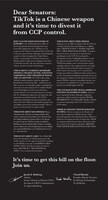Jacob Helberg Issues an Open Letter to the US Government, Co-Signed by Leading Defense Technology Companies
NEW YORK, Sept. 15, 2023 /PRNewswire/ -- The following statement was released by Jacob Helberg, Commissioner of the US-China Economic and Security Review Commission (USCC).
America's Innovation Ecosystem Is Critical to National Security: An Open Letter
We, the undersigned leaders of American technology companies focused on providing for our national security, are deeply concerned by the quickening pace of strategic technological adoption made by the Chinese Communist Party, and by the increasingly bellicose rhetoric and action it supports.
We believe technological superiority and innovation are indispensable to deterrence, and we are encouraged by significant actions taken by Congress and the Department of Defense to accelerate the development and adoption of advanced technology. Still, there is more that can and should be done. We believe that the historic urgency of the challenge at hand requires our government to further hasten the transition of private innovations into advanced military capabilities – and we stand ready to offer our support and expertise.
To be clear, we sincerely wish for peaceful relations between our countries. But when General Secretary Xi Jinping repeatedly says he is preparing his country for war, the free world risks making a strategic miscalculation of historic consequence if it does not take him seriously. We believe only a superior military can credibly deter war.
We recognize the work that Congress and the administration are doing in areas that have significant military and strategic second-order effects. Efforts to impose federal restrictions on Chinese technologies which pose a risk to U.S. national security, executive orders restricting outbound U.S. investment to China in strategic sectors and legislation aimed at eliminating U.S. reliance on Chinese telecommunications, semiconductor, cloud computing and other technologies, are all important steps forward.
Despite these important efforts, in too many cases, our fighting forces are equipped with tools decades behind commercial technologies most Americans use daily. Most new cars on the road today have more advanced AI than deployed U.S. military vehicles; social media apps like Instagram have better computer vision than many systems leveraged by the Department of Defense; and, until 2019, the United States' nuclear arsenal operated off floppy disks. Despite significant spending on defense, American military technology stagnates. This must and can change.
History teaches us that peace can endure only when aggressors are deterred by the consequences of war. As the world has learned in Ukraine, the best way for democracies to prevent another unprovoked war is to be credibly prepared to fight and win. A higher level of collaboration between the U.S. government and the technology sector is required if the United States and its allies are to re-establish our military advantage.
Toward that end, we support actions by Congress and the Administration to move forward on efforts:
- Codifying and accelerating initiatives such as those described in the Nontraditional Innovation Fielding Enterprise (NIFE) and Replicator initiative aimed at rapidly fielding autonomous systems across multiple domains;
- Modernizing defense trade laws and regulations under the ITAR and EAR by authorizing new licensing exemptions/exceptions for modern defense technologies and capabilities for Australia and the UK; and updating those regulations to reflect advances in technological development and to decontrol technologies that are no longer sensitive.
- Facilitating pathways for the Intelligence Community to identify and adopt cutting-edge technologies;
- Building on the President's executive order restricting American capital investments to China in strategic technologies.
We view these proposals as important steps and a starting point, rather than an end state. In addition to these proposals, we urge the U.S. government to consider broader systemic reforms:
- Shortening and providing better oversight of DoD contracting processes and timelines in order to more rapidly field capabilities to the warfighter;
- Incentivizing private investments in the research and development of strategic dual-use technologies and the rejuvenation of the defense industrial base;
- Empowering operational commands to rapidly field cutting-edge capabilities;
- Implementing the National Security Commission on AI's recommendation to meaningfully increase the DoD's annual investment in science and technology, particularly in artificial intelligence;
- Enhancing assured access to critical supply chain areas, such as microelectronics, strategic minerals, and energy storage, by supporting loan guarantee or tax incentive programs.
The United States and our allies and partners must maintain and protect a technological advantage to ensure security, stability, and prosperity. In that effort, our country's innovation ecosystem can and must play a critical part. We are eager to support this mission, in partnership with Congress and the Administration.
Signed by:
Adam Bry |
Jacob Helberg |
Oliver Palmer |
||||
AJ Piplica |
Joe Lonsdale |
Matt Ocko |
||||
Akash Jain |
John Gedmark |
Matt O'Connell |
||||
Alexandr Wang |
Jon Gruen |
Peter Tague |
||||
Brandon Tseng |
Josh Wolfe |
Richard Jenkins |
||||
Brian Schmipf |
Ken Bedingfield |
Tom Mueller |
||||
Chris Power |
Kevin Weil |
Will Bruey |
SOURCE Jacob Helberg

WANT YOUR COMPANY'S NEWS FEATURED ON PRNEWSWIRE.COM?
Newsrooms &
Influencers
Digital Media
Outlets
Journalists
Opted In




Share this article